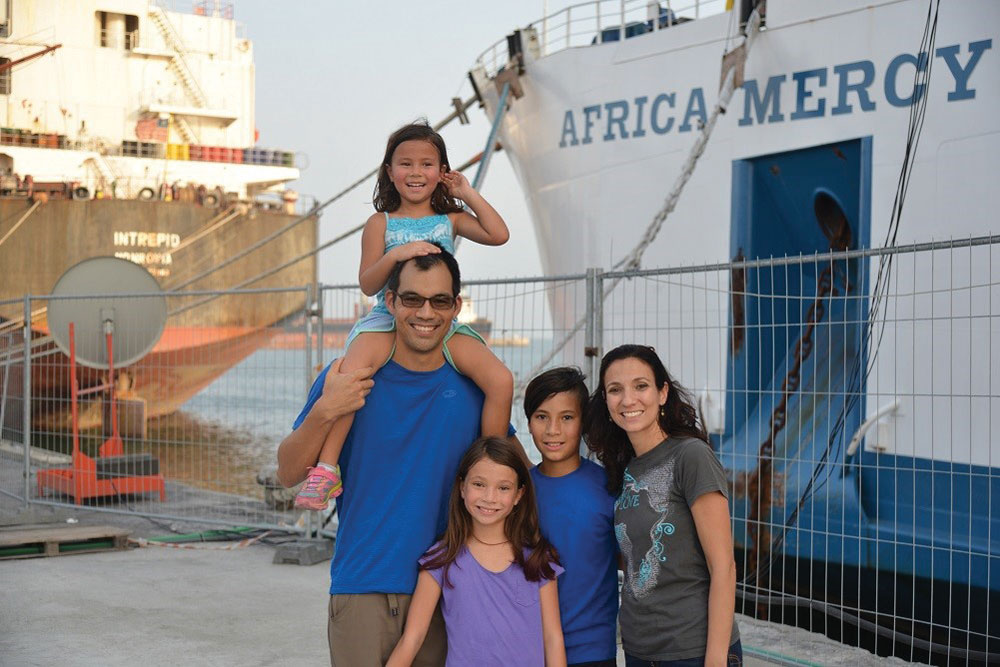 Brian Barki is featured on the National Geographic Channel series "The Surgery Ship," about the workings of largest civilian hospital ship in the world. Brian Barki, M.D., who completed his residency with the UAB Department of Anesthesiology and Perioperative Medicine in 2010, is featured on the National Geographic Channel series “The Surgery Ship.” It details the dramatic stories that take place aboard the ship Africa Mercy, the largest civilian hospital ship in the world. Operated by international charity Mercy Ships, Africa Mercy docks in the world’s poorest areas to provide life-saving care for patients in need. Barki shared his experiences with UAB Medicine.
Brian Barki is featured on the National Geographic Channel series "The Surgery Ship," about the workings of largest civilian hospital ship in the world. Brian Barki, M.D., who completed his residency with the UAB Department of Anesthesiology and Perioperative Medicine in 2010, is featured on the National Geographic Channel series “The Surgery Ship.” It details the dramatic stories that take place aboard the ship Africa Mercy, the largest civilian hospital ship in the world. Operated by international charity Mercy Ships, Africa Mercy docks in the world’s poorest areas to provide life-saving care for patients in need. Barki shared his experiences with UAB Medicine.
Q: How did you become involved with Mercy Ships?
I heard about Mercy Ships at UAB and was drawn to the idea of a hospital ship. I had been on medical mission trips before, where the work we did was helpful but limited because of the lack of equipment, supplies, medications, etc. With Mercy Ships, we bring a first-world hospital to the people.
After residency, I moved to Oklahoma and had the “perfect” life—great job, house, friends, church. I was content for a few years, but I started getting an unsettled feeling in my heart. My wife, Jamie, asked, “Why don’t we volunteer with Mercy Ships?” She was half-kidding, but that planted the seed.
I first volunteered with Mercy Ships for a two-week trip to the Republic of the Congo in 2013. I returned with Jamie the next year to get her input about our family doing this. She was all for it, so I quit my job in May 2015. Jamie, our three children, and I have been with Mercy Ships since that time.
Q: What is it like to volunteer with Mercy Ships, and why do you do it?
 Barki, his wife Jamie, and their three children all live aboard the hospital ship.As volunteers with Mercy Ships, we do not get a salary. In fact, we have to pay monthly crew fees that cover our room and board. This is in addition to health insurance, plane tickets, etc. We do this because we know God has called us to this work. For us, any other reason to leave family, friends, a great job, and the comforts of home would have been crazy.
Barki, his wife Jamie, and their three children all live aboard the hospital ship.As volunteers with Mercy Ships, we do not get a salary. In fact, we have to pay monthly crew fees that cover our room and board. This is in addition to health insurance, plane tickets, etc. We do this because we know God has called us to this work. For us, any other reason to leave family, friends, a great job, and the comforts of home would have been crazy.
The patients we serve are often outcasts and treated as modern-day lepers. People won’t have anything to do with them. To make matters worse, they do not have access to affordable, safe surgery. To offer these patients hope and a chance for a new beginning is fulfilling and reminds me why I became a physician.
I also love that Mercy Ships continues to expand its Medical Capacity Building program. We usually stay in each country we visit for 10 months at a time, where we help renovate hospitals and train anesthesiologists, nurse anesthetists, surgeons, midwives, nurses, sterilizers, and biomedical technicians.
Q: How did UAB influence you, and how can our readers help?
I am grateful for my time at UAB. Not only did I acquire the knowledge and skills necessary to do something like this, but I was also surrounded by tremendous people.
Alumni can help by spreading the word about Mercy Ships. UAB attendings can serve with a resident, and I’d love to see more UAB alumni on board. Dr. Todd Beasley [a 2003 anesthesiology residency alumnus] has already volunteered this year. People can serve on the ship for as few as two weeks. If teaching is your passion, you can come for one week and teach training courses. Interested physicians can learn more at mercyships.org.
By Julie Cole Miller